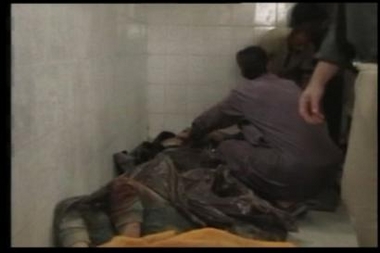New photographs lend weight to allegations of
revenge killings by US unit under attack in which 24 unarmed civilians died.

This image taken from a videotape made by a
Haditha, Iraq journalism student and obtained by Time Magazine via the
Hammurabi Human Rights Group, shows a scene in what appears to be a morgue
following an alleged fatal raid by United States forces which took place
on Saturday, Nov. 19, 2005, in Haditha, Iraq. The U.S. military is bracing
for a major scandal over the alleged killing of Iraqi civilians in Haditha
- charges so serious that they could threaten President Bush's effort to
rally support for an increasingly unpopular war.
[AP] |
Fresh photographic evidence seen by US
investigators is believed to reveal that some of the 24 unarmed Iraqis killed in
the Iraqi town of Haditha after an American died in a roadside bomb in November
were in effect executed, it was reported yesterday.
According to
Congressional and defence officials quoted by the Los Angeles Times, the
pictures show wounds to the upper bodies of the victims, who included several
women and six children. Some were shot in the head and some in the back.
'There wasn't a gunfight, there were no pockmarked walls,' the paper reports
a congressional aide as saying. And it quotes a US Defence Department official
who had been briefed on the contents of the photos as saying 'the wounds
indicated execution-style' shootings.
US military investigators are probing the events of 19 November 2005, and a
picture is gradually emerging of a small group of troops who lost control in the
wake of an unrelated attack on their vehicle, which left one of their comrades
dead. Other soldiers then helped to cover up the atrocity.
Claims that US marines massacred Iraqi civilians threaten to undermine public
support for keeping British troops in the country, the UK's most senior military
officer said yesterday. The Chief of Defence Staff, Air Chief Marshal Sir Jock
Stirrup, said that reports of the unprovoked killing of up to two dozen unarmed
Iraqis would be 'appalling' if proved accurate.
'Our people are in Iraq and other parts of the world doing difficult and
dangerous things in unpleasant circumstances on behalf of their country and they
need the support of the people in their country. This sort of accusation - and
it is at the moment just an accusation, of course - does make that harder to
achieve,' he told the BBC.
Two parallel investigations are trying to piece together what happened in the
incident. They were sparked by evidence first collected by Time magazine and
Iraqi human rights workers.
One probe, by the Naval Criminal Investigative Service, is examining the
killings, while another looks at any cover-up. Both are set to conclude in the
next few weeks. It is widely expected that they will end with the courts martial
of several marines and possible charges of murder.
Some top US politicians involved with defence issues have already been
briefed on the issue and they have told reporters that the evidence is damaging.
'Marines over-reacted... and killed innocent civilians in cold blood,'
Congressman John Murtha, a former marine, told the Washington Post. One retired
general, David Brahms, told the newspaper: 'When these investigations come out,
there's going to be a firestorm. It will be worse then Abu Ghraib. Nobody was
killed at Abu Ghraib.'
The incident happened after a hidden bomb exploded as a US marine unit passed
through Haditha. One marine, Miguel Terrazas, was killed. Two other marines were
also wounded in the blast.
What happened next is the focus of the investigations. Eyewitnesses and human
rights groups believe the marines swept through the town in a lust for revenge.
The attack may have lasted for several hours. At the end of it, 24 Iraqi
civilians had been killed. They included a 76-year-old amputee and a
four-year-old boy. In one house an entire family, including seven children, were
attacked with guns and grenades. Only a 13-year-old girl survived.
British soldiers currently in Iraq said they were anxious to distance
themselves from the Americans but that Iraqis did seem able to make a
distinction. One private, who did not wish to be named, said: 'We are given an
education: the Americans get shown how to use a gun. The Iraqis know the
difference.'
Captain Victoria Wedgwood-Jones, of 20 Armed Brigade, said: 'When the British
come and say we are British, they welcome us warmly.'